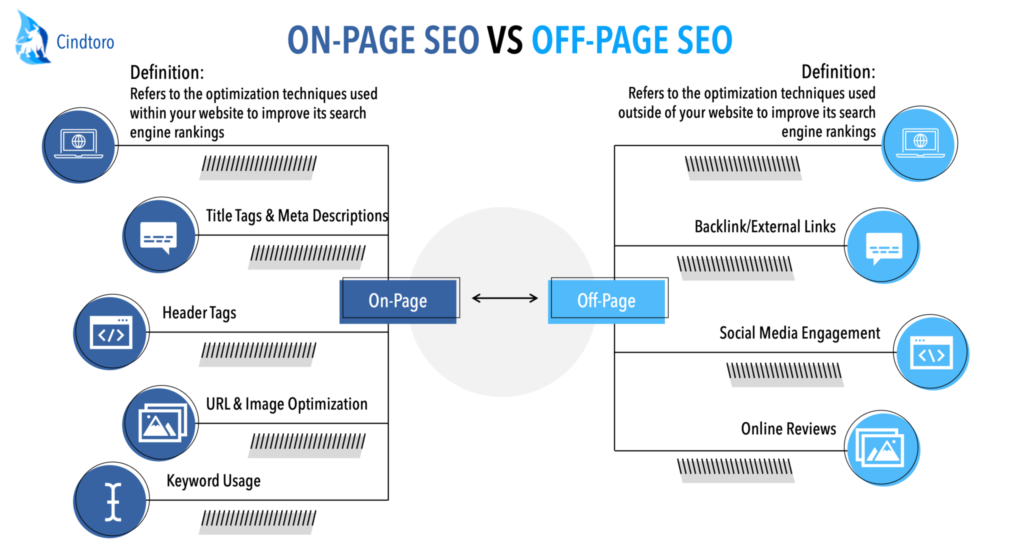In the world of digital marketing, Search Engine Optimization (SEO) is essential for improving the visibility and ranking of a website on search engines like Google. SEO can be broadly divided into two categories: On-Page SEO and Off-Page SEO. Both play crucial roles in enhancing a website’s performance, focusing on different aspects. This comprehensive guide will explore the intricacies of On-Page and Off-Page SEO. This article will provide an in-depth look at both On-Page and Off-Page SEO, their importance, and how affordable SEO services in Lahore can contribute to your website’s success.
Understanding On-Page SEO
On-Page SEO refers to the optimization strategies applied directly to your website to improve its search engine rankings and user experience. This comprehensive guide will delve into the various elements of On-Page SEO, which are within your control, making it a fundamental part of any SEO strategy.
a. Keyword Optimization
Keywords are the foundation of On-Page SEO. They help search engines understand the content of your page and match it with relevant user queries. This comprehensive guide emphasizes that effective keyword optimization involves researching the right keywords, incorporating them naturally into your content, and using them in strategic places like the title tag, meta description, headings, and throughout the body text.
b. High-Quality Content
Content is king in On-Page SEO. Search engines prioritize websites that offer valuable, informative, and engaging content. According to this comprehensive guide, high-quality content should be original, relevant to the target audience, and structured in a way that’s easy to read. Including images, videos, and infographics can also enhance content quality and user experience.
c. Meta Tags and Descriptions
Meta tags, including the title tag and meta description, are crucial for On-Page SEO. The title tag tells search engines what your page is about, and it appears as the clickable headline in search results. The meta description provides a brief summary of the page content, influencing click-through rates. This comprehensive guide advises optimizing both with primary keywords and writing them in a way that entices users to click.
d. URL Structure
A clean and descriptive URL structure helps both search engines and users understand the content of a page. URLs should be concise, include relevant keywords, and avoid unnecessary parameters or numbers. For example, a well-structured URL for an article on On-Page SEO might look like this:https://hammadali.online

Understanding On-Page SEO
e. Internal Linking
Internal linking involves linking to other relevant pages within your website. This comprehensive guide highlights that internal linking helps search engines crawl your site more effectively and improves the user experience by guiding visitors to additional content. Strategic internal linking can also distribute page authority and boost the rankings of key pages.
f. Mobile-Friendliness
With the increasing use of mobile devices, having a mobile-friendly website is essential for On-Page SEO. Responsive design ensures that your website adapts to different screen sizes and provides a seamless user experience across all devices. Google also considers mobile-friendliness as a ranking factor, making it a critical aspect of On-Page SEO.
g. Page Speed Optimization
Page speed is a crucial factor in both user experience and SEO rankings. A slow-loading website can lead to higher bounce rates and lower rankings. This comprehensive guide recommends optimizing images, minimizing code, and leveraging browser caching as some of the ways to improve page speed.
Exploring Off-Page SEO
Off-Page SEO refers to the actions taken outside of your website to improve its visibility and ranking on search engines. While On-Page SEO focuses on optimizing the content and structure of your site, Off-Page SEO is about building authority and trust through external factors. This comprehensive guide will explore how Off-Page SEO strategies can enhance your website’s credibility and drive more traffic.
a. Backlink Building
Backlinks are the backbone of Off-Page SEO. A backlink is a link from another website to yours, and search engines view it as a vote of confidence in your content. The more high-quality backlinks you have, the more authority your website gains in the eyes of search engines. However, not all backlinks are created equal; links from reputable and relevant sites carry more weight.
b. Social Media Engagement
Social media platforms offer a powerful way to promote your content and engage with your audience. While social signals (likes, shares, comments) may not directly impact search engine rankings, they can increase the visibility of your content, drive traffic to your website, and create opportunities for earning backlinks.
c. Influencer Outreach
Collaborating with influencers in your industry can amplify your content’s reach and enhance your Off-Page SEO efforts. Influencers can share your content with their audience, provide backlinks, and lend credibility to your brand. Building relationships with influencers can be a valuable part of your Off-Page SEO strategy.
d. Online Directories and Listings
Submitting your website to online directories and business listings can improve your Off-Page SEO. These platforms often provide backlinks to your site and help improve your local SEO efforts. Ensure that your business information is consistent across all directories to enhance your visibility in local searches.
e. Guest Blogging
Guest blogging involves writing articles for other websites in your industry. This strategy allows you to reach new audiences, establish yourself as an authority, and earn valuable backlinks. When guest blogging, focus on providing high-quality, informative content that adds value to the host site’s audience.
f. Brand Mentions
Unlinked brand mentions, where your brand is mentioned without a backlink, can still contribute to your Off-Page SEO. Search engines recognize these mentions as a sign of your brand’s authority and relevance. You can also reach out to the site owner to request that the mention be turned into a backlink.
3. The Synergy Between On-Page and Off-Page SEO
While On-Page and Off-Page SEO focus on different aspects of optimization, they work best when combined in a cohesive strategy. On-Page SEO ensures that your website is optimized for search engines and provides a great user experience, while Off-Page SEO builds authority and drives traffic from external sources. Together, they create a powerful SEO strategy that can significantly improve your website’s search engine rankings, visibility, and overall performance.
Conclusion
Understanding and implementing both On-Page and Off-Page SEO is crucial for achieving long-term success in the digital landscape. By optimizing your website’s content, structure, and external factors, you can create a well-rounded SEO strategy that enhances your online presence and drives sustainable growth. Whether you’re a seasoned digital marketer or a business owner looking to improve your website’s performance, mastering these SEO techniques is key to staying ahead of the competition.



